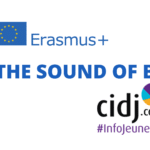
Overseas Countries
and Territories Association

Overseas Countries
and Territories Association

01/01/2017 - 31/10/2017
40902,66
New Caledonia
Erasmus+
In contemporary society, sound is present everywhere. On the one hand, people are externally surrounded by a continuous stream of sound and, on the other hand, our resonating bodies are real sound producers themselves. The first type of sound can be shared with everybody as it is brought forth by elements in the environment (e.g. the radio, a traffic jam, the leaves of a tree). These sounds are different in every place and thus in every European country. The latter type of sound refers to the intrinsic sound inside a person. Sounds are more than we can hear: we can also feel, think and wish. All those experiences are rushing through our veins and, as such, produce a personal sound. Sounds do not, therefore, merely differ across European countries, but are unique for each and every European citizen. As we live in an individual society there is a great need to recreate shared experiences and, therefore, the aim of this project is to challenge this individual experience of sound, and start sharing it.
Today, it is very difficult and almost impossible to listen to the pure sound which is internally produced and that which is produced by our environment. Through the project: The Sound of Sea, we would like to take some time to recognize these sounds in and around youngsters. We hope that the medium of sound will help youngsters gain insight into their own sound (what makes them who they are) and the sound of other participants (what makes other people who they are). Just as the sound of the sea is similar but different in each place, we shall not only recognize differences between the Belgian and French cultures but focus on the similarities as well. The sound of the sea stands for both the sounds that make the participants unique and the sounds that they have in common. On the one hand, this project can be seen as an experiment wherein we discover what it is like to exclude all other forms of sensory experience except sound. This experiment will give the youngsters the opportunity to be aware of what they are familiar with feeling and seeing and will confront them with a brand new experience of the pure presence of sound. Through this method, the participants can learn to be more aware of sound.
THE SOUND OF B consists of a group of 14 New-Caledonian youngsters and 14 Belgians. The whole group is intensively involved in the organization of the exchange program itself e.g. coming up with the project, designing its contents, preparing the activities, as well as organizing the workshops during the program and finding their own sound. They form several groups to work out the individual parts, but always in an open dialogue with the other participants from Belgium and New-Caledonia.
It is expected that the project will have a lot of impact on several different aspects:
Participants will be able to think critically, get a better perspective on the world, and will be able to compare their own culture with others and explore their own sound. They will have more self-knowledge, be more self-assured as they will constantly be challenged to give the best of themselves. They will be able to share their emotions. Through participants respecting each other, a great deal of intercultural learning will take place. They will find creative solutions in unexpected situations and they will be able to use digital techniques to record and combine the sounds, which will give them the opportunity to share their results.
Strengthening youngsters will automatically strengthen the participating organizations as well. Future projects will surely benefit from the experience the organization, and youngsters had.
It can also inspire youngsters to start their own projects, participate in similar projects and find their own sound or understand the sound of others.
